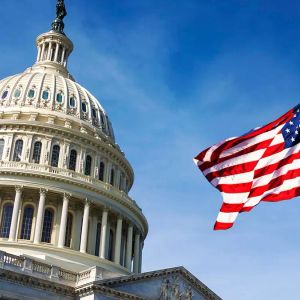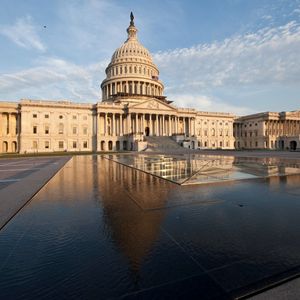The world of cryptocurrency is often unpredictable, but a recent development out of Washington D.C. has injected a significant dose of optimism. After months, if not years, of debate and legislative maneuvering, U.S. politicians have reportedly reached a bipartisan agreement on crucial stablecoin regulation . This is big news, and it signals a potentially clearer path forward for a vital part of the digital asset ecosystem. A Rare Moment: What Does This Bipartisan Crypto Bill Agreement Signify? In the often-polarized landscape of U.S. politics, achieving bipartisan consensus on complex issues is a rare feat. The fact that Republicans and Democrats have found common ground on a bipartisan crypto bill is noteworthy in itself. According to a report by U.Today, this agreement centers around a bill known as the GENIUS Act. Previously, efforts to regulate stablecoins faced opposition from various corners, including some pro-cryptocurrency lawmakers on both sides of the aisle who had differing views on how best to approach the technology. The reported breakthrough suggests that key sticking points may have been resolved, paving the way for potential legislative action. The next immediate step, as reported, is that Republicans plan to push for a vote on this agreed-upon text in the Senate sometime this week. Understanding the Focus: Why is a US Stablecoin Bill a Priority? Stablecoins are cryptocurrencies designed to maintain a stable value, typically pegged to a traditional currency like the U.S. dollar, or sometimes to commodities or algorithms. Their potential uses are vast, from facilitating faster and cheaper payments to enabling seamless trading within the crypto market. However, their growing importance and connection to traditional finance have raised concerns among regulators worldwide, including in the United States. A dedicated US stablecoin bill is seen as necessary to address several key areas: Financial Stability: Ensuring that stablecoin issuers hold adequate reserves and operate transparently to prevent ‘runs’ similar to bank runs, which could potentially impact the broader financial system. Consumer Protection: Establishing rules to safeguard users’ funds and provide clarity on the rights and responsibilities of stablecoin holders and issuers. Preventing Illicit Finance: Implementing measures to prevent stablecoins from being used for money laundering, terrorist financing, or other illegal activities. Fostering Innovation: Providing regulatory certainty allows legitimate businesses to build and innovate using stablecoins with clear guidelines. Without clear federal rules, the regulatory landscape for stablecoins in the U.S. has been fragmented, relying on a mix of state-level licensing and existing financial regulations that weren’t specifically designed for digital assets. What Might the GENIUS Act Entail? (Based on Previous Discussions) While the specific text of the agreed-upon GENIUS Act has not yet been publicly released, previous legislative proposals and discussions around stablecoin regulation offer clues about what it might include. Common themes in past bills have involved: Issuance Requirements: Mandating that stablecoin issuers obtain specific charters or licenses, potentially from federal or state regulators, or both. Reserve Standards: Requiring stablecoins pegged to the dollar to be fully backed by high-quality, liquid assets (like cash, cash equivalents, or short-term government bonds) held in segregated accounts, subject to regular audits and public attestation. Oversight Authority: Designating which federal agencies (like the Federal Reserve, Treasury Department, SEC, or CFTC) will have primary oversight responsibilities, potentially in coordination with state regulators. Prohibitions or Restrictions: Some proposals have considered restrictions or outright prohibitions on certain types of stablecoins, such as purely algorithmic stablecoins that lack traditional asset backing. Interoperability: Rules potentially aimed at ensuring different stablecoins can interact and be transferred easily across different platforms and blockchains. The agreement suggests that compromises have been reached on these potentially contentious points, finding a balance that satisfies a majority of lawmakers involved in the negotiations. Looking Ahead: What Does This Mean for Crypto Regulation in the US? This development around the GENIUS Act is a significant step, but it’s important to remember that it’s not the final word on crypto regulation US . The process involves several more hurdles: Senate Vote: The bill must pass the Senate. While the bipartisan agreement is positive, passage is not guaranteed and could still face procedural challenges or amendments. House Action: A similar or identical bill would need to pass the House of Representatives. If the House passes a different version, the two chambers would need to reconcile their differences in a conference committee. Presidential Assent: The final, identical bill passed by both the Senate and the House must be signed into law by the President. Even if the GENIUS Act becomes law, it primarily focuses on stablecoins. However, its passage could set a precedent and potentially build momentum for addressing other areas of crypto regulation, such as exchanges, decentralized finance (DeFi), or non-fungible tokens (NFTs). Challenges and Opportunities on the Horizon While the prospect of clear stablecoin regulation is widely seen as beneficial for fostering legitimacy and adoption, challenges remain. Critics might argue about the specifics of the bill’s requirements, potential burdens on smaller innovators, or the balance of power between federal and state regulators. The exact details, once released, will be crucial for assessing the bill’s full impact. However, the opportunity for the U.S. to establish a clear regulatory framework for stablecoins is immense. It could enhance financial stability, protect consumers, and solidify the country’s position in the evolving global digital economy. A Step Forward for the US Stablecoin Bill The reported bipartisan agreement on the US stablecoin bill , the GENIUS Act, represents a potential breakthrough moment for crypto regulation in the U.S. It demonstrates that consensus is possible on digital asset policy and sets the stage for potential legislative action soon. While the details of the bill and its path through Congress are still unfolding, this development is a clear signal that policymakers are serious about establishing rules for this critical component of the crypto market. The coming days, particularly with the planned Senate vote, will be crucial in determining the immediate future of this significant legislative effort. To learn more about the latest crypto market trends, explore our article on key developments shaping stablecoin regulation and institutional adoption.

















